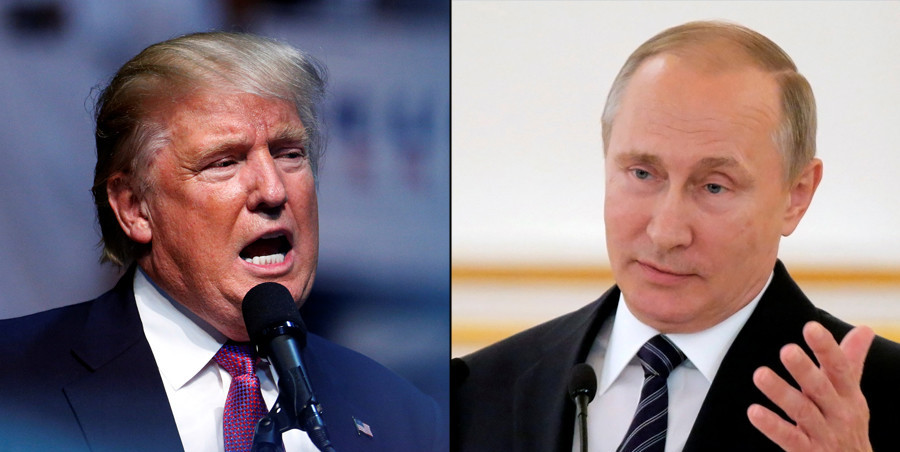US officials say there is specific information of Trump associates’ discussions with Russians
Developments on Day 62 of the Trump Administration:
Officials: FBI Info of Trump-Russia Contacts During Campaign
Unnamed US officials reinforce FBI Director James Comey’s confirmation of an investigation of possible “coordination” between the Trump campaign and Russian officials, telling CNN that the FBI has specific information of communications that may have arranged the release of information damaging to Trump’s Democratic opponent Hillary Clinton.
The officials cautioned that the information was not conclusive and that the investigation is ongoing.
See also US Podcast: FBI’s Comey Rattles Trump Over Russia Links
TrumpWatch, Day 60: FBI Confirms Investigation of Trump-Russia “Coordination”
One “law enforcement official” said the information so far suggests “people connected to the campaign were in contact and it appeared they were giving the thumbs up to release information when it was ready”. However, other officials said it is premature to draw that inference from largely circumstantial evidence.
The FBI is already investigating four former Trump campaign associates — Michael Flynn, Paul Manafort, Roger Stone, and Carter Page — for contacts with Russians known to US intelligence. It is not confirmed if any of them are named in the information about the possible coordination.
Sources said the investigation faces the challenge of a cut-off communications between Trump’s associates and the Russians in recent months, given the public focus on Russia’s interference in the 2016 election. Some Russian officials have also changed their methods of communications, making monitoring more difficult, the officials said.
Why Did House Intelligence Committee Chairman Brief Trump?
House Intelligence Committee chairman Devin Nunes raises questions about his conduct as he briefs Donald Trump about the Committee’s investigation.
Nunes said he went to Trump with information that communications of the President and his associates may have been picked up after the November election by US intelligence agencies, as they conducted surveillance of foreign targets.
The California legislator’s “revelation” is not really a revelation. The top-secret FISA Court granted a warrant last October to the FBI and other agencies to investigate the extent of Russian interference in the election, likely authorizing the surveillance of Russian officials.
Among those officials was the Russian Ambassador to the US, Sergei Kislyak, who was in contact with Trump associates before and after the election. The five conversations between Michael Flynn, designated to be Trump’s National Security Advisor, and Kislyak on December 29 — the day President Obama announced sanctions on Moscow over Russian hacking and election interference — eventually led to Flynn’s departure from the Trump Administration after 24 days.
Nunes’ dramatic declaration did not directly support Trump’s claim — comprehensively dismissed by US intelligence agencies as well as legislators — that Barack Obama wiretapped Trump Tower last summer. However, his statement of the monitoring of conversations with Trump associates was welcomed by the President.
Asked if he felt vindicated by the visit from Nunes, Trump answered: “I somewhat do. I must tell you I somewhat do, I very much appreciated the fact that they found what they found.”
Observers noted a possible conflict of interest, since Nunes joined Trump’s transition team days after the election.
I'm honored to have been named to the @realDonaldTrump transition team. https://t.co/P4Y6da6Ieh pic.twitter.com/q2n4N0ZaHV
— Devin Nunes (@DevinNunes) November 11, 2016
The top Democrat on the House Intelligence Committee, Adam Schiff, said he was not consulted before Nunes went to Trump. He warned that the chair had cast a “profound cloud” over the committee’s investigation.
Schiff added that there is now “more than circumstantial” evidence of collusion between Trump associates and the Russians.
NEWS: Schiff tells @ChuckTodd: “there is more than circumstantial evidence now…there is evidence that is not circumstantial” —@MeetThePress pic.twitter.com/s6ETKA1hyT
— Bradd Jaffy (@BraddJaffy) March 22, 2017
Trump Advisor Manafort’s Work to Help Putin Regime
Before serving as Donald Trump’s campaign manager, Paul Manafort secretly worked for a Russian billionaire with a plan to “greatly benefit the Putin Government”, according to The Associated Press.
Manafort proposed in a confidential strategy plan as early as June 2005 that he would influence politics, business dealings, and news coverage inside the US, Europe and former Soviet republics to benefit the Putin regime. He pitched the plans to aluminum magnate Oleg Deripaska, a close Putin ally with whom Manafort eventually signed a $10 million annual contract beginning in 2006, according several sources familiar with payments and business records obtained by the AP.
Manafort and Deripaska maintained a business relationship until at least 2009, according to one person familiar with the work.
“We are now of the belief that this model can greatly benefit the Putin Government if employed at the correct levels with the appropriate commitment to success,” Manafort wrote in the 2005 memo to Deripaska. “[This] will be offering a great service that can re-focus, both internally and externally, the policies of the Putin government.”
White House spokesman Sean Spicer said Donald Trump was not aware of Manafort’s work on behalf of Deripaska.
“To suggest that the president knew who his clients were from 10 years ago is a bit insane,” Spicer said. “I don’t know what [Manaport] got paid to do. There’s no suggestion he did anything improper.”
Manafort confirmed that he had worked for Deripaska but denied his work had been supportive of the Putin regime in nature. He added, “I look forward to meeting with those conducting serious investigations of these issues.”
An official representative of Deripaska said simply in a statement Wednesday: “There was an agreement between Mr. Deripaska and Mr. Manafort to provide investment consulting services related to business interests of Mr Deripaska which now is a subject to legal claims.”

